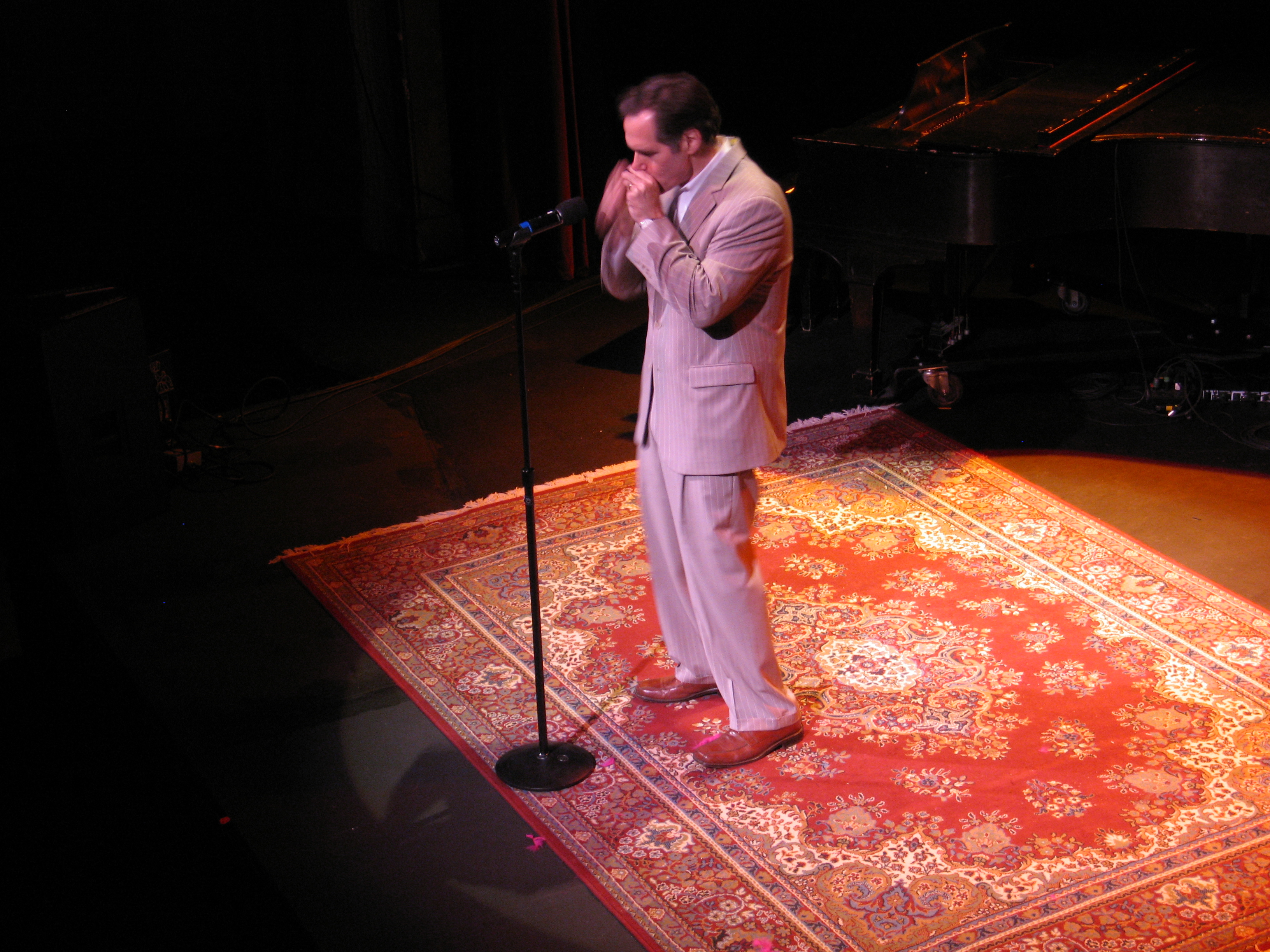
Live with Derrik and the Dynamos, Wilson, WY, August 2014
I had the opportunity to perform with Derrik Huffsmith and his band Derrik & the Dynamos at a gig near Wilson, Wyoming this August. The band included Phil Round on bass and vocals, Ed Domer on drums, and Don Christenson, who I’d never met before, on keys. We played a lot of covers at this gig; this performance, of Dylan’s “Ill Be Your Baby Tonight,” is one of my favorites from the gig.
Derrik is singing lead on this piece, Phil harmonies. The harmonica solos at about 2:41, after the piano, by which time the song has built significantly, and maintains a prominent presence from that point on. The emotion in the entire performance is very strong throughout.
I played the gig with my Audix Fireball mic, Digitech RP360XP, and Peavey KB2, as usual, and it took about 5 minutes to set up, as usual. Derrik didn’t have a spare XLR cable, and neither did I, so we ran a 1/4″ cable from the Peavey’s FX send to the PA, and I used the Peavey as on onstage monitor, also per usual. I don’t recall what patch I was using on the RP, though I know it’s one of the standard ones from my patch set for RP360XP. It’s a clean sound with just a touch of reverb or slapback on it; it could be a patch based on a Twin Reverb amp model, a direct amp model, or something else. I think it’s probably either my direct + room reverb (DIRROOM) or direct + hall reverb (DIRHALL) patch–I can hear that the reverb is under footpedal control. Anyway, it does the job here, which is allow the harp to cut through the band without grating on single notes, chords, and octaves, all of which are in use in this arrangement. Lots of clean gain in this patch. The harp is an orchestral element on this piece, and the clarity in the sound helps make the changes in tones and textures come through clearly.
The harmonica is a Seydel Session Steel in A, played in second position. I like Session Steels–they play hard and stay in tune, two qualities on the top of my list for harmonicas. I took to the A and Bb Session Steels right away; for some reason it took me longer to love my C and D, but I do now.
The piece was recorded via the internal mics on the Zoom H4, with the Zoom hanging at one side of the stage, near the edge of the outdoor tent that surrounded the dance floor, and its mics facing the band from about 20 feet away and a height of about 6 feet. The recorded sound is surprisingly good, largely because there was a clear line of sight from the Zoom to one of the band’s PA stacks, though of course the crowd makes noise.
Enjoy.
“I’ll Be Your Baby Tonight” performed by Derrik & the Dynamos with Richard Hunter, harmonica, August 2014
Related Posts
4 Comments
Leave a Reply
You must be logged in to post a comment.
WHAT’S NEW
Categories
- Audio/Video
- Blog
- Blue Future
- Digitech RP Tricks and Tips
- Discography, CDs, Projects, Info, Notes
- Featured Video
- For the Beginner
- Gallery
- Hunter's Effects
- Hunter's Music
- Huntersounds for Fender Mustang
- Meet the Pros
- More Video
- MPH: Maw/Preston/Hunter
- My Three Big Contributions
- Player's Resources
- Pro Tips & Techniques
- Recommended Artists & Recordings
- Recommended Gear
- Recorded Performances
- Reviews, Interviews, Testimonials
- The Lucky One
- Uncategorized
- Upcoming Performances
- Zoom G3 Tips and Tricks
This was a pretty good version of one the many great songs of one of my musical heroes, Bob Dylan.
Even though, I love Dylan’s singing I have to admit that sometimes his enunciation isn’t as pronounced as it should be. In this case, the singer’s pronunciation was good and it made me appreciate the song more.
The harp player was excellent too in that his interpretation matched the feeling of the song without running over the vocalist.
@ Dennis: Thanks!
Nice recording – I’m also using a Twin amp with reverb and a bit of detune for that country/cajun/ etc sound. I’ve learned to live with crowd noise – but can’t stand when the bar forgets to turn off the TV audio or house music – even if i can barely hear it
@ Larry– do you mean a real Twin Reverb, or a modeled one? I’m thinking the latter, given that “real” Twins don’t pack a detune function, but thought I’d confirm.